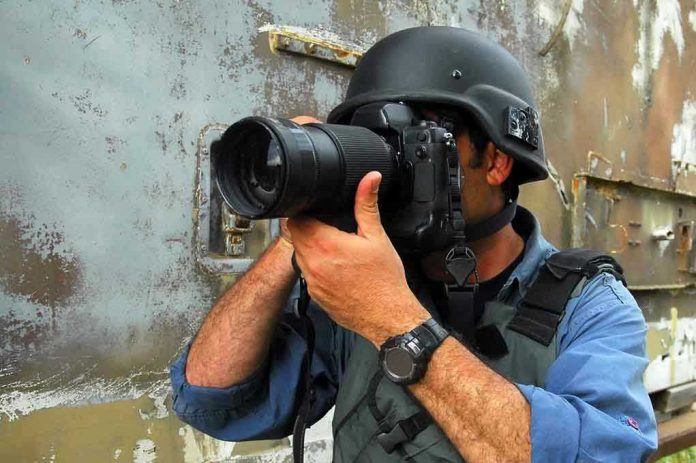
The fate of one BBC journalist trapped by paperwork in Vietnam now threatens to unravel diplomatic progress, press freedom, and the illusion that trade trumps truth.
Story Snapshot
- A BBC journalist based in Thailand is barred from leaving Vietnam, with passport and ID withheld since August 2025.
- The incident coincides with high-profile UK-Vietnam trade talks and deepening diplomatic ties.
- Vietnam’s use of bureaucratic detention underscores persistent crackdowns on press freedom.
- The journalist’s ordeal exposes the tension between economic interests and human rights advocacy.
Bureaucratic Detention as a Tool of Control
Vietnamese authorities have perfected the art of silencing dissent not with dramatic show trials, but with the quiet grind of bureaucracy. In August 2025, a Vietnamese national working for the BBC in Thailand returned home for a family visit and routine passport renewal. Instead of the expected stamps and signatures, the journalist found themselves cut off from the outside world—passport confiscated, national ID withheld, and subjected to hours of relentless questioning about their reporting. No formal charges. No courtroom drama. Just the slow suffocation of professional and personal liberty, all under the watchful gaze of a one-party state that ranks near the bottom of every global press freedom index.
For weeks, the authorities’ questions circled the same themes: the journalist’s work for the BBC, their contacts, their coverage of sensitive issues. Each interrogation served as a warning—Vietnam’s message to its own citizens and the world was clear: the media’s leash is short, and it is firmly held by the state.
Diplomacy at Odds with Reality
This episode does not play out in isolation. While the journalist remained in limbo, Vietnamese General Secretary Tô Lâm traveled to London for meetings meant to solidify an upgraded “Comprehensive Strategic Partnership” with the UK. British officials extolled their commitment to defending media freedom, even as their handshakes and trade agreements with Vietnam gathered headlines. Behind the scenes, the UK government faced a dilemma: push too hard on human rights, and risk jeopardizing £8.1 billion in annual trade; stay silent, and betray the BBC journalist—and the very principle of press freedom the UK claims to champion.
The BBC, uncharacteristically blunt, called for the immediate release of their colleague. The UK Foreign Office issued statements reaffirming its support for free media. Yet the Vietnamese authorities did not budge. The timing of the incident—hitting just as Tô Lâm’s delegation landed in London—was more than inconvenient. It was a test: would Britain’s leaders risk their economic ambitions to defend one of their own journalists? The world watched, and so far, the answer has been silence over action.
The Chilling Effect and International Fallout
Vietnam’s bureaucratic tactics may lack the drama of police raids or show trials, but they are no less effective. The journalist’s predicament has sent a chill through the region’s press corps, especially among Vietnamese nationals working for foreign outlets. The knowledge that a routine family visit can turn into indefinite limbo is enough to prompt self-censorship, or to avoid home altogether. Reporters Without Borders calls Vietnam “one of the world’s biggest prisons for journalists.” The Committee to Protect Journalists ranks it the fifth-worst jailer worldwide. Each statistic now has a face—a BBC journalist trapped between two countries and two sets of interests.
The diplomatic costs remain uncertain. If the UK presses harder, Vietnam may dig in its heels, risking both economic and reputational fallout. If Britain backs down, it signals to every authoritarian regime that trade comes before truth. The BBC, for its part, finds itself in the awkward position of both reporting the news and becoming part of it—a circumstance that underscores the stakes for all international media working in restrictive environments.
Where Economics and Ethics Collide
The case is more than an individual tragedy or a diplomatic inconvenience. It is a warning flare for every journalist operating in or reporting on authoritarian states. The lesson is stark: even those with international backing and prestigious employers are not immune to the slow, suffocating grip of bureaucratic repression. The broader impact is already visible—foreign newsrooms reassessing their risk, advocacy groups turning up the pressure, and governments forced to confront the limits of their own rhetoric on human rights.
As Vietnam’s leaders and their British counterparts toast to new trade deals, one journalist remains stranded, a pawn in a larger game. The open question—how far will the world’s democracies go to defend those who speak inconvenient truths—hangs heavily in the air, unanswered and unresolved.
Sources:
BBC Journalist Held in Vietnam Amid Deepening UK Trade Ties
BBC says journalist questioned and blocked from leaving Vietnam

